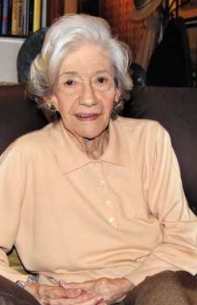Ana María Matute facts for kids
Quick facts for kids
Ana María Matute
|
|
|---|---|
 |
|
| Born | 26 July 1925 Barcelona, Spain
|
| Died | 25 June 2014 (aged 88) Barcelona
|
| Resting place | Cemetery of Montjuïc |
| Occupation | Writer |
| Organization | Member of the Real Academia Española |
| Awards | Cervantes Prize |
Ana María Matute Ausejo (born July 26, 1925 – died June 25, 2014) was a famous Spanish writer. She was also a member of the Real Academia Española, a very important group for the Spanish language. In 1959, she won the Premio Nadal for her book Primera memoria. She was the third woman to receive the Cervantes Prize, which is one of the biggest awards for writers in Spanish. Many people consider her one of the most important novelists from the period right after the Spanish Civil War.
Contents
Ana María Matute's Early Life and Influences
Ana María Matute was born on July 26, 1925. When she was four years old, she became very sick. To help her get better, she went to live with her grandparents in a small mountain town called Mansilla de la Sierra.
Matute later said that the people she met in this town deeply influenced her. You can see this influence in her stories, especially in her 1961 collection Historias de la Artámila (Stories from Artámila). The settings in many of her books also remind readers of this special town.
How the Spanish Civil War Shaped Her Writing
When Matute was ten years old, the Spanish Civil War began in 1936. This war had a huge impact on her writing. She wrote not only about the battles between the two sides but also about the struggles people faced within their own groups.
After the war ended in 1939, Spain was led by a military government. This period lasted until 1975. Matute grew up and became a writer during this time. Because of this, her stories often explored themes like unfairness, feeling alone, and the loss of childhood innocence. Her work was also checked by the government, and she was sometimes fined for what she wrote.
Matute's Unique Storytelling Style
Matute published her first story, The Boy Next Door, when she was just 17. She was known for writing about the lives of children and teenagers. She often showed their feelings of being let down or isolated.
She also liked to mix in elements of myths, fairy tales, and fantasy into her works. Matute often spoke about how emotional challenges can help people grow. She believed that people are always changing and that innocence is never completely lost.
Matute as a Professor and Lecturer
Ana María Matute was also a university professor. She studied in the Netherlands and traveled to many countries. She gave talks and taught as a guest instructor.
For four decades, she worked in the United States. She spoke at colleges like Our Lady of Cincinnati College in 1966. She also lectured at Hood College in Maryland and was a visiting professor at the University of Virginia. In 1990, she spoke at Brigham Young University about how to translate stories. She also gave talks at the universities of Oklahoma and Indiana.
She was an honorary member of the Hispanic Society of America. She was also a member of the American Association of Teachers of Spanish and Portuguese.
Awards and Recognition
Matute won many awards for her writing. In 1958, she won the Premio Nadal for her novel Los Mercaderes. She also received the Planeta Prize and the Café Gijón Prize. Her most famous award was the Cervantes Prize.
Death
Ana María Matute passed away on June 25, 2014, from a heart attack. She was 88 years old. She was buried in the Cemetery of Montjuïc in Barcelona.
External Resources
The Hispanic Division at the Library of Congress in Washington, DC, has a special recording. It features Ana María Matute herself reading from her book Algunos muchachos. She recorded this on May 5, 2000. You can find this recording in the Archive of Hispanic Literature online. It includes parts like the "Prologue" and sections from "El rey de los zennos."
See also
 In Spanish: Ana María Matute para niños
In Spanish: Ana María Matute para niños
 | Georgia Louise Harris Brown |
 | Julian Abele |
 | Norma Merrick Sklarek |
 | William Sidney Pittman |

